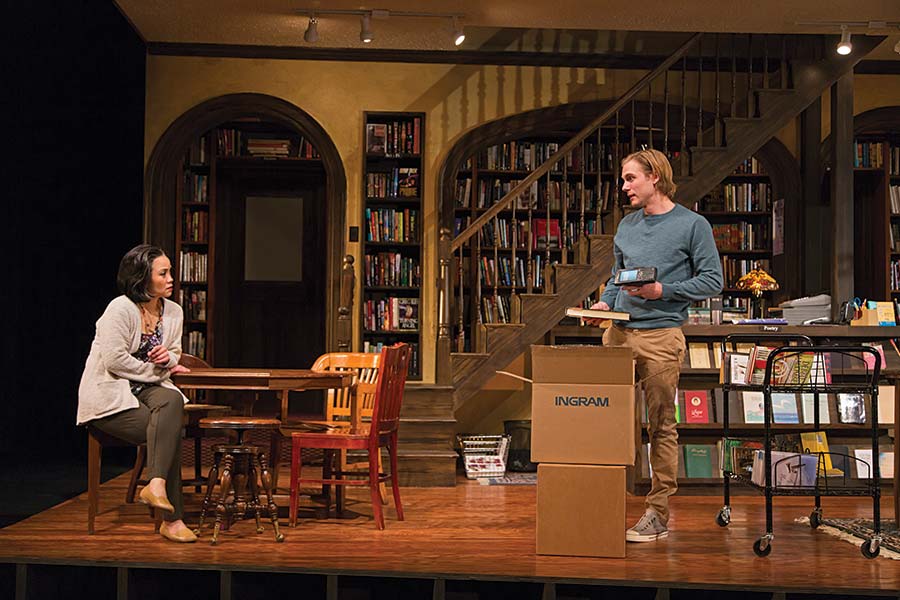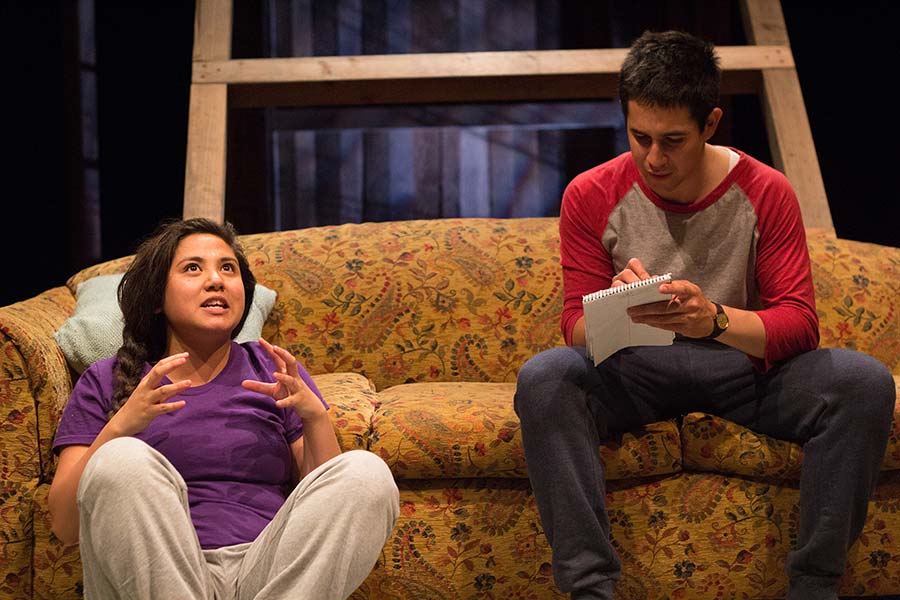A. Rey Pamatmat laughs with his whole body. He does so often—when something is funny, makes him nervous or uncomfortable, or when a topic is just too depressing, it’s the only thing to do. But he’s also serious and eloquent about the topics he addresses in his plays: grief, bullying, growing up. The list goes on.
“I don’t think I’m a mean playwright,” he says. “But I do like to challenge people.”
He’s also a busy playwright, with two productions running this spring. First up is after all the terrible things I do at Chicago’s About Face Theatre, from March 11 to April 10. The play, which explores the psychology of intimidation, had its world premiere at Milwaukee Repertory Theatre in 2014 and played at Boston’s Huntington Theatre Company last year.
His newest offering, House Rules, centers on two families struggling with the thought of losing their respective parents. As each family’s grown children consider what life will look like after their parents are gone, they also wrestle with each other about keeping their parents’ traditions alive while pursuing their dreams, even if they’re no longer practical.
The play runs March 25–April 16 at Ma-Yi Theater Company, Pamatmat’s artistic home in New York City. After graduating from Yale University with his MFA in playwriting, Pamatmat found a sense of belonging as a founding member of the theatre company’s writing group in 2004. He also found a kindred spirit in artistic director Ralph B. Peña, who is directing House Rules. Pamatmat’s reputation preceded him; Peña said he’d heard about “this Filipino playwright” at Yale and was immediately intrigued, as the two share that background. But apart from their cultural affinity, Peña has marveled as Pamatmat has honed his skills.
“He really is committed to the craft—he’s not churning out the same things again and again,” says Peña. He also loves Pamatmat’s openness in the rehearsal room and collaborative spirit, but most of all he appreciates that the playwright is “a lot of fun. I’m crazy and he’s crazy with me.”
But House Rules is actually his first production at Ma-Yi, and only his second in New York City, where he lives (his last NYC show was Thunder Above, Deeps Below in 2009 at Second Generation). Pamatmat hasn’t been idle in the interim: He’s been busy writing and teaching (currently at SUNY Purchase), and has had his share of productions at resident theatres, including the high-profile Actors Theatre of Louisville premiere of Edith Can Shoot Things and Hit Them in 2011.
“The real challenge with artists of color is that you don’t get the same sort of basic support that a lot of artists who are not people of color get,” Pamatmat says. That’s where his home theatre has been crucial: It’s generally hard, he says, for artists of color to find companies to do readings or workshops of their plays early in their careers. “When I wasn’t getting any attention, I could always develop work [at the Ma-Yi Writers Lab].”

While all his plays are personal to him, they’re not explicitly autobiographical. Pamatmat was never bullied, for instance, and in fact wrote terrible things in an effort to understand and sympathize where bullies are coming from (“I came out in high school,” he says, “and it was fine!”).
With House Rules, he confesses, he’s a little closer to the material. Though the play’s siblings are more prone to spats than he and his two real-life sisters, Pamatmat feels that the play is about his family. For one, all the characters go by nicknames, a common occurrence in Filipino culture. (Pamatmat’s mother calls him “Punga,” which he says he doesn’t know the origin of or know how to spell.) At readings of the play, Pamatmat and the actors have spoken about their nicknames; everyone had one to share.
The play began with a commission from the late PJ Paparelli at Chicago’s American Theater Company, who was seeking short plays for a festival about ethnicity. Pamatmat wrote a scene in which the characters are playing sungka, a traditional Filipino game, and one-upping each other on who’s more Filipino than the other. The play continued as a series of scenes with the characters playing various games and evolved into its current form of families struggling with legacies and independence.
“When I write about ethnicity, I try to do it from the inside,” he says. “I don’t like writing about ethnicity as a thing to display to other people. I think that it’s more interesting if the audience steps into your shoes.”
The play that put Pamatmat on the map was Edith Can Shoot Things and Hit Them, which had a rolling world premiere that started at Actors Theatre’s Humana Festival of New American Plays and continued on to New Theatre in Miami, Actor’s Express in Atlanta, and Mu Performing Arts in St. Paul, Minn. Set on a remote Midwestern farm, the play follows two young siblings struggling to protect each other as they navigate family, first loves, and an incident with a pellet gun.
Pamatmat says he’s surprised by the play’s popularity. Partly based on his own experiences growing up on a nonworking farm outside Port Huron, Mich., Edith was written without expectations that it would be produced—a common approach he finds creatively freeing.
“It’s just easier to write [a play] approaching it like no one will ever do this play, so I can do whatever I want,” says Pamatmat. “Edith just seemed so small and sometimes unambitious,” he continues. “It was just like, I’m going to write the tiniest play I can write. And then it just did so well.”
Pamatmat’s longtime collaborator May Adrales directed the Humana production, and she’s read or worked on all of his plays except for House Rules, which at this point she’s consciously avoiding so she can experience it as an audience member. The two met when they were both at Yale—everyone kept telling them they should meet because they were the “only Filipino students going through the program,” she recalls. But they didn’t become close until she was an artistic associate at the Public Theater in New York and Pamatmat worked in the development department.
“During my breaks I would just go sit on his desk and chat with him while he entered data,” she says. (Pamatmat’s frequent day job, then as now, is installing development software for theatre companies; he’s also worked at Manhattan Theatre Club and NYC’s Second Stage.)
Adrales also directed the world premiere of after all the terrible things I do at Milwaukee Rep. “I value his artistic opinions so much, and I’ll talk to him about other shows I’m working on. We don’t always agree,” she says, but she admires “his passion and his intellectual curiosity.”
In 2015 the play was at the Huntington in a staging directed by Peter DuBois, while Company One produced Edith. But some of the Boston press coverage was upsetting, overly focusing on the plays’ issues of race and sexuality. A review in The Boston Globe wondered why the characters’ racial background wasn’t more of an issue in Edith. And during a preshow interview for terrible things, a reporter asked Pamatmat why Linda, a bookstore owner in the play, was Filipino.
“I just flat-out said to the interviewer, ‘You would never ask a white playwright why they’re writing white characters,’” Pamatmat recalls. “If there is anything I should get away with by default, it’s writing Filipino characters and gay ones—like, why would you ask?”

This spring, House Rules is running at a theatre of color and terrible things is at an LGBT-focused theatre. While race and sexuality are not the central topics of his plays, he hopes the audiences at these theatres will see his plays differently than they’ve been seen elsewhere.
“I am really happy to finally be at a gay theatre, frankly,” Pamatmat says. “I do think my plays are Asian American and gay,” he continues, “but I don’t write about those topics as though the topics themselves are issues. I think it’s a mistake in the expectations of the audience. If we’re going to see a play that involves race, then race must be a problem or the race must be the characters’ problem, and the same with sexuality. I do hear it—that people think my plays aren’t gay enough or aren’t Asian enough. But I think they’re the ones who have limited ideas of what those plays can be.”
Lesbian performance artist Holly Hughes was one of Pamatmat’s teachers when he was studying acting at New York University, and the first play he wrote, he recalls, was supposed to be a solo performance about “what everyone’s first play is about—getting dumped!” But he didn’t like being onstage alone, so he wrote an ensemble of five other characters. “After I did that one, I just realized I liked it better when I wasn’t in it. I liked the stuff other people were doing.”
About Face’s artistic director, Andrew Volkoff, who is helming the company’s terrible things, thinks the definition of what constitutes gay theatre is constantly changing, and he hopes programming Pamatmat’s play will help accelerate that change.
“The stories that we’re telling onstage now are really so much about the humanity of it all, and it has to do a lot with the intersectionality of who we are as people because that is where that complexity lies,” Volkoff says.
And Pamatmat’s next project deals with how quickly the country has changed. He wrote a play while he was at Yale, Picture 24, about a love triangle between a guy, his best friend, and someone he meets on the Internet, back when “the Internet was dirty.”
A few years later he wrote Beautiful Day, set around the time Massachusetts approved same-sex unions at the same time that Pamatmat’s home state of Michigan, along with 12 others, went out of their way to amend their state constitutions to define marriage as exclusively heterosexual. The play takes place at a wedding in Michigan, with the character from Picture 24 now widowed and at the ceremony with other friends. Now he’s penning the final play in the triptych, with the same character returning. This time the character is proposed to by his boyfriend, and he says no.
“I wrote them not expecting the world to change so quickly—and then it did,” he says. “We’ve gone from disease-ridden faggot to the couple next door with an adopted Asian baby in such a short period of time. The stereotype has changed that much.”
Not that it was easy going back to his early plays, which he’s revisiting and treating as deliberate period pieces. “Part of making this huge project was setting them very firmly in the time where they are, and setting them in those times that people today and later would understand,” he says. “It’s not just fixing an old play; there’s a purpose to fixing it.” He’s found it gratifying to “revisit old work without it being nostalgic. It has an active 2016 reason to exist and reason for me to fix it—and not just because I’m embarrassed.”
And then he laughs.


